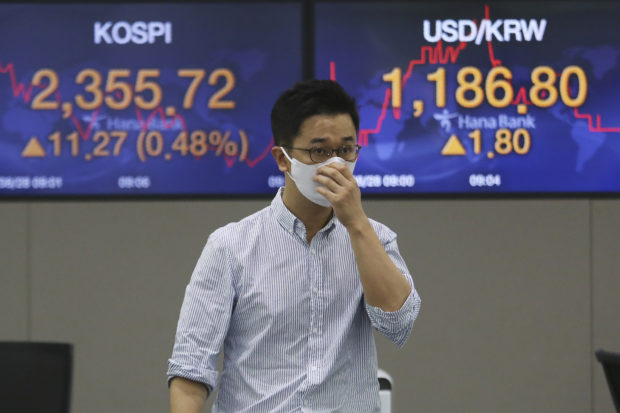Asian markets higher as Fed chair says interest rates to stay low

A currency trader passes by screens showing Korea Composite Stock Price Index (KOSPI), left, and foreign exchange rate at the foreign exchange dealing room of the KEB Hana Bank headquarters in Seoul, South Korea, Friday, Aug. 28, 2020. Asian markets were mostly higher Friday after the Federal Reserve said it might keep interest rates low even if inflation rises, in a major overhaul to its strategy. (AP Photo/Ahn Young-joon)
Asian markets were mostly higher Friday after the Federal Reserve said it might keep interest rates low even if inflation rises, in a major overhaul to its strategy.
Shares rose in Japan, South Korea, Shanghai and Hong Kong but fell in Sydney.
Overnight, the S&P 500 ticked 0.2% higher, further into record territory and closing at 3,484.55, after Federal Reserve chair Jerome Powell said in a speech that it might keep interest rates low to help prop up the pandemic ravaged economy even if inflation rises above its target level of 2%.
The hoped for change in the Fed’s strategy is a huge deal for markets that have been rescued by central banks slashing short-term interest rates and buying all kinds of bonds.
Japan’s consumer price index rose 0.3% in July, the government reported, down from 0.6% the month before.
Article continues after this advertisementThe Bank of Japan has kept interest rates near or even below zero for most of the past decade, seeking to spur inflation and entice companies and consumers to spend more. It has yet to see inflation hit the 2% target set by its governor, Haruhiko Kuroda, in 2013.
Article continues after this advertisementKuroda has said he will do what he can to support the economy but that central bank policy cannot ensure sustainable long-term growth.
The disruptions dealt by the coronavirus pandemic have pushed many economies into downturns, causing demand and upward pressure on prices to soften. Low interest rates keep credit cheap to encourage investment and other spending.
“With the adoption of allowing inflation to overshoot their target, the Fed is slowly becoming the BOJ,” Edward Moya of Oanda said in a commentary. “The Fed did not give any hints on how they will achieve inflation and that is why no one is buying that it will happen anytime soon.”
In Tokyo, the Nikkei 225 index gained 0.4% to 23,292.80 while Hong Kong’s Hang Seng climbed 0.6% to 25,428.47. The Kospi in Seoul jumped 1.1% to 2,369.73. Sydney’s S&P/ASX 200 was flat, at 6,067.90, while the Shanghai Composite index edged 0.1% higher, to 3,352.58.
Shares fell in Taiwan but rose in Southeast Asia.
On Wall Street, prices for stocks, bonds and gold all made several U-turns after Powell’s highly anticipated speech. In it, he essentially said the Fed may continue efforts to prop up the economy even if inflation rises above its target level of 2%, as long as it had been weak before then.
The Dow Jones Industrial Average climbed 0.6% to 28,492.27, while the Nasdaq composite fell 0.3% to 11,625.34 after paring an earlier loss of 1%.
With its fifth straight day of gains, the S&P 500’s has climbed 56% since late March after the immense support of the Fed helped halt its earlier free-fall and erase its pandemic losses.
Low interest rates often act like steroids for stocks, allowing their prices to rise faster than corporate profits.
“The era of easy money is here,” said Mike Loewengart, managing director of investment strategy at E-Trade Financial.
The yield of the 10-year Treasury was at 0.78%, up from 0.68% late Wednesday. The 30-year yield climbed to 1.50% from 1.41%.
A report Thursday showed the pace of layoffs sweeping the country remains incredibly high but may be slowing. A little more than 1 million U.S. workers applied for unemployment benefits last week, down slightly from just over 1.1 million the week before.
In another report, the government also said that the economy looks like it shrank at an annual rate of 31.7% in the spring quarter. That would be the sharpest quarterly drop on record, but it’s not as bad as the Commerce Department’s earlier estimate of 32.9%.
Financial stocks had the biggest gain among the 11 sectors that make up the S&P 500, up 1.7%. A higher 10-year Treasury yield allows for higher rates on mortgages and other loans, which boosts profits for banks. JPMorgan Chase gained 3.3%, and Wells Fargo rose 2.3%.
Benchmark U.S. crude oil lost 5 cents to $42.99 per barrel in electronic trading on the New York Mercantile Exchange. It fell 35 cents to settle at $43.04 per barrel on Thursday. Brent crude, the international standard, picked up 1 cent to $45.61 per barrel.
In currency dealings, the U.S. dollar bought 106.91 Japanese yen, down from 106.57 yen late Thursday. The euro rose to $1.1844 from $1.1823.